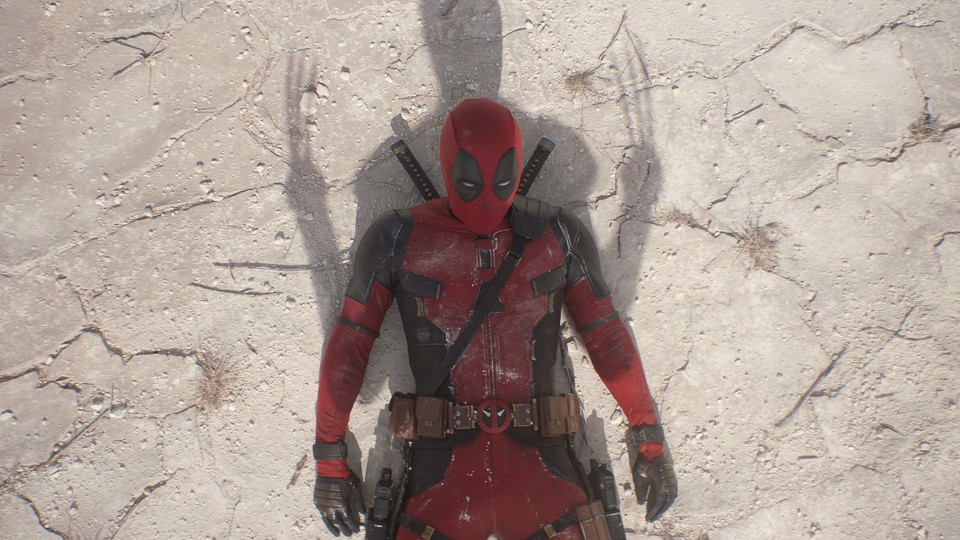Want to See a Snake Eat Its Tail?
4 min read
The first Deadpool film, released in 2016, broke lots of rules. It was R-rated and hyper-violent, but it was also self-aware in the Family Guy way, frequently puncturing the fourth wall and mocking the seriousness of the superhero genre. Deadpool, played by Ryan Reynolds, knew he was in a movie—and a dumb one, at that. This intentionally juvenile humor bred massive success, and by 2018’s Deadpool 2, our quippy antihero knew he was in a cinematic universe—albeit the junky one run by 20th Century Studios that quivered alongside the ruthless success of Disney’s Marvel enterprise. (For those of you who haven’t relentlessly kept up: The film rights to the different Marvel superheroes are owned by different studios, and it’s generally accepted that Marvel Studios—which is owned by Disney—has made the better movies.)
Times change, corporate acquisitions happen, and now we have Deadpool & Wolverine, in which Deadpool not only knows he’s in a cinematic universe but also wants to go to a better one. It’s an almost entirely metatextual movie—a series of Variety articles given life, crammed in a Lycra suit and encouraged to curse with impunity. Shawn Levy’s film exists to properly usher Deadpool into Disney’s squeaky-clean Marvel Cinematic Universe, helped along by the wearily professional Wolverine (Hugh Jackman), dragged out of retirement (and death) for one last rodeo. But Deadpool & Wolverine is also a gleeful funeral for all the stunted series and cinematic universes the MCU has squashed over the years, even referencing long-rumored projects that never came to fruition.
Yes, the film is razzing the corporate frameworks around these beloved (or sometimes despised) enterprises. But it also assumes that audiences know as much as Deadpool does inside his own movie. Deadpool is very aware that the MCU mastermind Kevin Feige is his new producer, that his jokes about cocaine won’t fly under Disney’s radar, and that Hugh Jackman is both too old for this nonsense and very good at singing Broadway numbers. At times, the movie more resembles a jokey sizzle reel at CinemaCon than it does actual cinema. For viewers who spend a lot of their time online, soaking up the discourse generated by insider-fan accounts and message boards, all of this will seem warmly familiar. But good luck if you’re coming in with no prior knowledge.
Nevertheless. Feige’s mainstream instincts are easy to detect here. The prior Deadpool films were scuzzy and cobbled together, even as the budget grew; the cameos from other Marvel characters felt half-hearted and perfunctory, inclusions for Deadpool to roll his eyes at, not for fans to cheer over. Deadpool & Wolverine, on the other hand, has that bland MCU sheen that makes all of its movies look expensive but nonthreatening, happily accepting of mediocrity rather than attempting something artsy or daring. Similarly, what passes for the narrative stakes have been honed to fan-service perfection, with characters spouting sci-fi gibberish about how characters such as Wolverine are “anchor entities” that keep universes going, essentially proclaiming that superheroes are the most important things imaginable.
The MCU has undoubtedly lost some commercial and critical momentum, but because Deadpool & Wolverine is so firmly focused on satisfying the nerds, I predict it’ll crush at the box office. The familiar presences of Reynolds and Jackman will definitely help; I’ve certainly grown tired of the former’s motor-mouthed wisecracking in every single movie, but he’s very comfortable with Deadpool’s profane monologues. Jackman, meanwhile, can deliver gravitas in his sleep, even as his role here diminishes the glorious swan song he received in 2017’s Logan, in which he sort of went out like Clint Eastwood. (Deadpool & Wolverine is aware of this too, and makes several jokes about it.)
Shall I attempt to describe the plot of this jokey mash of cutaway gags and PowerPoints? Very well. Deadpool, a scarred mercenary with a healing factor, has largely drifted toward retirement and a life of hanging out with his pals from the previous two movies. But then he’s tossed into a cosmic in-between zone run by the Time Variance Authority (from, uh, TV’s Loki), the bureaucrats managing every cinematic universe seen and unseen. A fussy stuffed suit named Mr. Paradox (Matthew Macfadyen) tells Deadpool that his world is vanishing and irrelevant, but that he’s been chosen for a brighter future: the MCU, where mysterious overlords have decided he belongs. So he goes on a timeline-hopping adventure, assisted by a particularly drunk and miserable Wolverine on the way, to try to save his friends from deletion.
My head hurt typing that out, and it’s probably just as inscrutable to read, but it also doesn’t really matter. Deadpool is here, Wolverine is grunting alongside him, and they stab lots of folks and make lots of jokes while exciting actors make nostalgic cameo appearances. It’s a movie that’s playing to the back of the house—assuming the house is Comic-Con’s Hall H—and it’ll get lots of laughs in return. Can Deadpool himself save the faltering MCU? Probably not. But with four more MCU movies slated for release in 2025, it’s a little relieving to watch someone poke fun at how pompous they’ve become—as much fun as Feige allows, that is.



